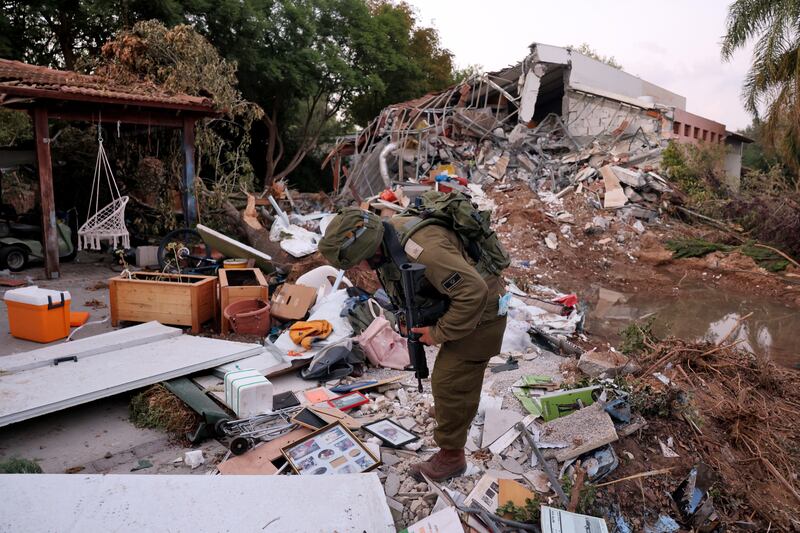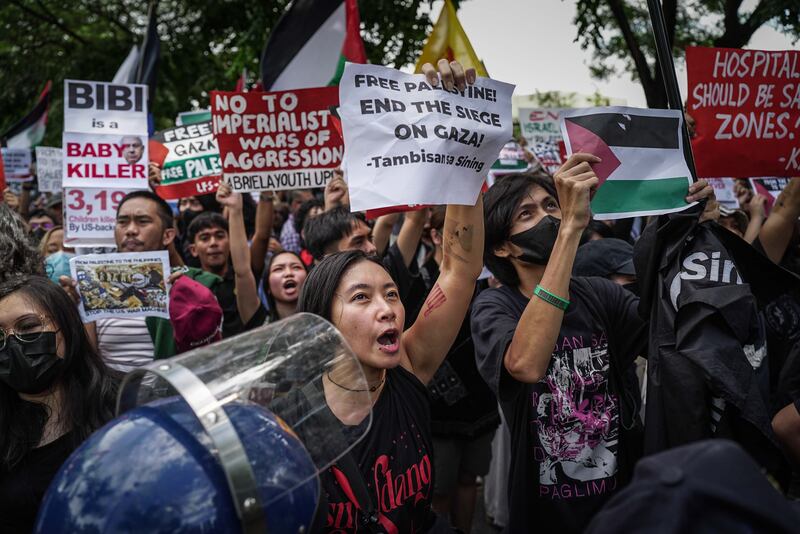Filipino migrant workers who have fled the war between Israel and Hamas said they feel lucky to be alive. But as they settle back to their lives at home, the returnees face another difficult reality – they’ve lost their jobs and earnings.
Mylene Rivera, 47, a caregiver at Kibbutz Be’eri near the Gaza Strip, thought she might die on Oct. 7, the day Hamas militants stormed the border town as part of a wave of surprise attacks on southern Israel.
Rivera awoke at 6 a.m. that day to the sound of a party nearby. Minutes later, she heard explosions outside the home where she was staying.
As an emergency siren went off, she roused her elderly employer from sleep. They spent the day without food or water, and could hear the rattle of gunfire as fighting raged outside, she recounted.
“I didn’t know if I was going to survive or not,” Rivera said during a press briefing upon her arrival in Manila on Oct. 18.
“I was shaking in fear. I was crying while messaging my family back home. I told my children that I love them so much and they should take care of themselves and not worry about me. I told my husband I love him and to take care of our kids.”
Rivera is one of 10 million Philippine migrant workers who venture abroad in search of jobs to support their families back home.
On Oct. 7, Rivera recalled, she was paralyzed by fear because she had heard that Hamas did not spare anyone including “babies, elderly, foreigners.”
When rescuers from the Israel Defense Forces arrived in tanks, Rivera said she wasn’t prepared for the horror she saw outside – houses in flames and dead Israeli soldiers and civilians on the ground.
Despite her fears, the thought of seeing her family pushed Rivera to move along.
About 30,000 Filipinos, mostly caregivers, remain in Israel, while about 130 are still in Gaza, according to the Philippines’ Department of Foreign Affairs.
Rivera and others who were evacuated from Israel are to receive 50,000 pesos (U.S. $882), as well as skills training and separate financial assistance from the Technical Education and Skills Development Authority (TESDA), according to the Department of Migrant Workers.
They will also receive a physical and mental examination from the Department of Health and the Department of Social Welfare and Development.
The Philippine citizens (about 10% of the population) working and living abroad are called Overseas Filipino Workers. The money they send back to their families through remittances amounted to $36.1 billion (2 trillion pesos) in 2022, keeping the economy afloat because it accounted for 8.9% of the country’s gross domestic product.
Since Hamas launched its attacks that left about 1,400 Israelis dead – mostly civilians – Israel’s military has hit back with airstrikes that leveled neighborhoods in the densely populated Palestinian enclave. In recent days, it launched a ground strike into Gaza to hunt down Hamas fighters.
As of Friday, the Associated Press reported that the Palestinian death toll had reached more than 9,600 – mostly women and children – citing information from Gaza’s health ministry.
‘No one told us what to do’
Two Filipino overseas workers who returned home this week, Jay Meniado, 36, and Ernesto Bergonio, 37, initially thought they were safe and far away from harm while they were working at a hotel in Tiberias in northern Israel.
But days after the Oct. 7 attacks by Hamas, the Lebanese armed group Hezbollah started firing missiles into their area. Meniado and Bergonio had been in Israel for only seven and 11 months, respectively, when they found themselves caught up in violence between long-time Middle East adversaries.
“When the airstrikes happened, we were not prepared. It was our first time to experience such an event. No one told us what to do,” Meniado said during a press briefing upon his return to Manila on Oct. 30.

Unable to run to the hotel’s bomb shelter, he ended up hiding under the apartment building’s staircase.
Siren warnings of missile attacks stuck with him. Almost every sound of movement he heard outside jangled his nerves.
“I felt uneasy just hearing the sounds of helicopters and military vehicles patrolling Tiberias,” he said.
“I could not sleep well because I kept on thinking, ‘What if a missile suddenly hit our flat while I was sleeping soundly?’”
Bergonio said that he too was traumatized.
“I had anxiety. Every time we would hear loud explosions, our windows and walls would start shaking from the impact. It was unlike any other,” Bergonio said.
Challenges of going home
While Rivera, Meniado, and Bergonio welcomed the Philippine government’s repatriation program for their safety and well-being, the decision to return was not easy.
Bergonio lamented about his loss of livelihood – he had signed a contract for five years but had to leave Israel after only about a year there. He was worried about being able to provide for his 73-year-old mother.
“My mother is part of my dream as an Overseas Filipino Workers,” Bergonio said while holding back tears.
“I was not able to save up anything and I have lots of things to pay for. But my mother was the one who told me to prioritize safety, which is why I decided to go home,” he said.
Bergonio pleaded to the government to help others like him find jobs in “safer” places – an unfortunate reality as the Philippines has a shortage of jobs.
In a separate interview with BenarNews, he said: “I thought of finding a job here but with the difficult life here in the Philippines, it seemed next to impossible.
“But of course, if there is a good opportunity here, why would I not take it?”

Staying in Israel
Hotel worker Marivic Yape, 40, said she was unsure if she would return to the Philippines even though Yemen’s Houthi militant group had recently targeted Eilat, the city where she lives.
A first-time migrant worker, Yape told BenarNews that she had borrowed about $3,500 (198,550 pesos) from relatives and lending companies to pay for her work permits, medical exams and airfare to Israel. After more than a year, she is still paying back the debt.
“It’s regrettable if I give up this job. I worked hard to get here. Besides, when I go back to the Philippines, the financial assistance they will give us is not enough,” Yape told BenarNews on Thursday in an interview via Facebook messenger.
While the government has promised a small amount of financial assistance to those opting for repatriation, Yape said she likely would work in Israel until it was no longer safe.
“Lately there have been the sounds of sirens. I get scared, I could not sleep and I would cry, but I just don’t tell my family about it,” she said.
“I sometimes blurt out, ‘I want to go home to the Philippines alive’ but at the same time I know I have to work because I have obligations and loans to pay.”
Yape is scheduled to fly to the Philippines next month for a brief vacation, after paying for her airfare in monthly installments. But with the sharp escalation in the Israeli-Palestinian conflict, she’s uncertain if that will be possible.
“Many aspects of our lives right now are pending,” she said.
